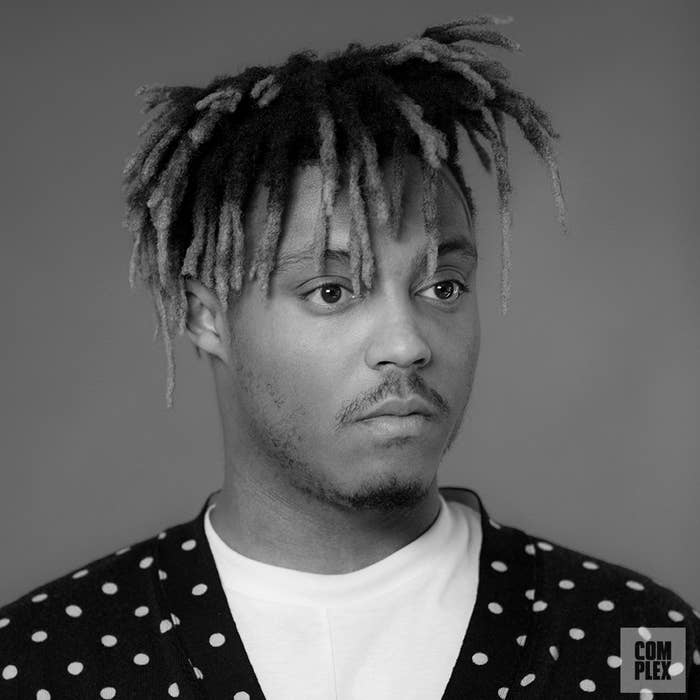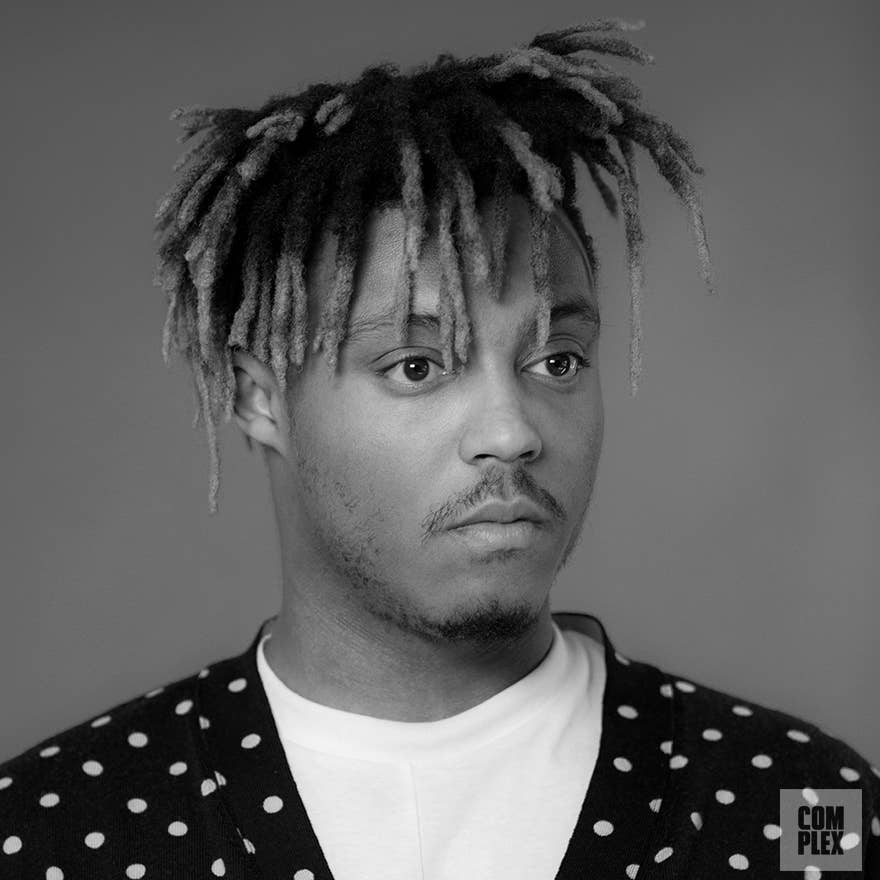
“Life's unreal when death's uncertain/It's funny how the blessed ones had the most curses/Heart falling to the floor if we lose another person.”
Like far too many of the young artists we’ve lost recently, Juice WRLD rapped often about mortality, but he also found joy in making emotionally honest, genre-defying music that reached stunning mainstream heights. The 21-year-old artist passed away suddenly and shockingly after suffering a seizure in a Chicago airport on December 8, leaving behind a discography both wounded and joyful. It’s filled with tales of love, heartbreak, and addiction, delivered with youthful urgency and exuberance. Juice WRLD, born Jarad Anthony Higgins, was the perfect symbol for how the internet-born hip-hop scene of the late 2010s, known to most as “SoundCloud Rap,” would transition into the mainstream—adding more polish and depth, but keeping the open-hearted, confessional nature that made it the preferred subgenre of millions of young people.
“Juice is one of the most down-to-earth artists, and everybody would tell you about it,” his day-to-day manager Peter Jideonwo told Complex in March. “He’s not on no Hollywood shit.”
Juice WRLD could be anything to anyone: a heartbroken emo rap crooner, and a talented MC with a deep reverence for rap’s past who loved the art of freestyling in a way matched by few of his contemporaries. Throughout 2019, he had begun branching into a wide array of sounds and scenes. He worked with A-list pop stars from around the globe while stepping up his traditional rap bona fides and simultaneously developing his songwriting and melodies. He notoriously recorded everything off the top of his head in the studio, exhibiting an exceptional ability to freestyle for hours on end. After famously signing a massive eight-figure deal with Interscope at the beginning of his mainstream rise, the Homewood, Illinois, native was becoming the superstar he was always meant to be.
His debut studio album, 2018’s Goodbye & Good Riddance, is one of the most dynamic bodies of work in the emo rap canon, featuring career-making hits like “Lucid Dreams” and “All Girls Are the Same,” as well as quality album cuts like the sardonic “Black & White” and the ode to lost love “Candles.” Juice knew he was capable of experimenting with different styles, but instead of bristling at the “emo rap” label, he saw the power of that sound to comfort young listeners who were going through hard times.
“I think it’s only a part of me,” he told Vulture in late 2018. “There’s more to me as an artist than that type of music, but I don’t have a problem with [the emo rap label] all. Emotional shit is life, so why shouldn’t music be?”
His voice, a combination of youthful whine and world-weary rasp, was perfect for conveying longing and hurt. He brought out the best of it by writing sweet, simple melodies that were streamlined on verses and swelled to stadium-ready proportions on hooks. He was willing to make himself look foolish in his pursuit of love, a quality shared by few peers. “No protection on my heart, goddamnit, I'm gon’ hit it raw,” he sang tellingly on “Flaws and Sins,” with an almost countryish twang.
“In love with all your flaws and sins/Your scars are really gorgeous/Ain’t that a weird way to give compliments?” he said sweetly on the same record.
Juice WRLD’s death comes as especially tragic news for the millions of young people who connected so viscerally with his music after watching massively influential figures like XXXTentacion and Lil Peep pass in recent years. Juice eulogized his deceased peers on the Too Soon... EP, which featured two of his most gut-wrenching songs, “Legends” and “Rich and Blind.” The former is now especially difficult to hear. “What’s the 27 Club? We ain’t making it past 21,” he rapped bleakly. Indeed, his untimely death is the latest in a troubling pattern of tragedies affecting the young artists who have been touted as saving the music industry.
It was clear that Juice saw the impact his music was having on the youth and took that seriously. He said as much in his reaction to Sting’s lawsuit over the interpolation of his song “Shape of My Heart” on “Lucid Dreams.”
“Lost millions made millions,” he tweeted. “The song impacted too many people in a good way for me to be upset over it. There’s always more money to be made and I will make it.”
That kind-hearted side of Juice WRLD is the one that’s been highlighted again and again in messages posted by those who workedwithhim, knewhim, and coveredhim. Though his music was often dark and angry, his standing and widespread love among industry peers owe to his friendly nature, quick wit, and vulnerability.
In his short career, he harnessed the energy coming from the SoundCloud rap scene and pushed it to extraordinary mainstream heights as he pulled off feats like No. 1 albums and sextuple platinum singles. His videos with Cole Bennett increased in scope and ambition from the surreal and crude animation of “All Girls Are The Same” in February 2018 to high-gloss, blockbuster visuals for 2019 tracks like “Bandit” and “Robbery.”
“Juice WRLD is one of the most talented people I know,” Bennett gushed in a 2018 interview with Complex. “The way he works is crazy. Almost every song that comes out, he freestyles. Even songs that he puts together with a hook and a bridge and a full layout of what a song should be, he freestyles.” He added, “He's addicted to working. He just always wants to work [...] Juice WRLD is in place to be a superstar, a legend, to be remembered forever.”
He also worked closely with peers, helping fellow SoundCloud star (and close friend) Ski Mask the Slump God achieve his highest chart position ever with “Nuketown,” a song that channels the cathartic screaming and energy of early South Florida rap and casts Juice as his rage-filled foil. Ski Mask’s reaction to Juice’s death has been particularly upsetting, as the Florida MC has lost yet another close friend: “They keep taking my brothers from me.”
Juice was unafraid to try on different sounds and styles in the public eye. On his sophomore LP, Death Race for Love, he experimented with vibrant dancehall (“Hear Me Calling”), frosty trap (“The Bees Knees”), and pure pop punk (“Ring Ring”). He was in the nascent stages of breaking into the global pop world, working with artists like Benny Blanco, Halsey, and even BTS. He directly linked generations in rap by making WRLD on Drugs with Future, a project that showed he had earned the respect of a 2010s icon.
“His music today is universal to me, like anybody can listen to it, from a kid to a teenager to an adult,” Lil Bibby, who signed Juice WRLD to Grade A Productions back in 2017, told Complex. “I think he can be like Drake, for real. I think he can be like that because his music can touch everybody.”
The universality of his sound was a product of Juice’s eclectic musical inspirations. While he was vocal about being influenced by rock acts like Fall Out Boy, Escape the Fate, and Paramore, he was also a clear student of more traditional hip-hop in ways that set him apart from his peers.
When I met him at a Midtown Manhattan studio in August 2018, we spoke about the summer he spent freestyling for anyone who would listen, for as long as he was allowed. That included freestyling for over an hour straight with Tim Westwood, as well as sessions on Big Boy’s Neighborhood, Hot 97, and many more. In an era when so much freestyling is either clearly pre-written or phoned in, Juice clearly found joy in the spontaneity of it all. He was a natural.
“It’s almost as if the beat is like a world and it’s my playground,” he told me. “I can just do whatever I want.”
He used those freestyles as a way to flex tremendous stylistic dexterity. He rapped over everything from Pusha-T’s “Trouble on My Mind” to ASAP Rocky’s “Goldie,” and even spat for another near-hour over nothing but Eminem instrumentals. The then-19-year-old could barely contain a smile during that particular freestyle, ping-ponging around the zany beats of “Just Lose It,” “Crack a Bottle,” and more. Though he could have easily talked himself up as a generation-bridging figure after successes like this, Juice was extremely humble during my visit with him, identifying simply as a student of the game and a product of the times.
“Stuff is just changing, that’s all,” he told me with a shrug. “We’re moving into a new era of music. I feel like it’s not necessarily a good thing to forget where shit started, but shit is changing. Who am I to try and predict what it turns into? Shit’s moving, shit’s shifting.”
When I ran out of questions during our interview and was about to head out, Juice had other plans. He eagerly queued up the beat for JAY-Z’s “Dead Presidents” and offered to freestyle on the spot. I sat back down, expecting him to spit a few bars to prove the point, but he rapped for nearly 15 minutes, closing his eyes and transporting himself to the aforementioned playground, leaving everyone in the room in stunned silence.
“All of the shit I see, you see it, too, I keep sharing my vision,” he rapped at one point.
It’s a tragedy that we only got a relatively small glimpse of that vision, but the music he did share will surely inspire a generation to share their feelings, push boundaries, and make music for nothing more than the love of it.
“This life is yours,” he told fans a week ago. “Do what tf you want do. Great things. And change the world.”




